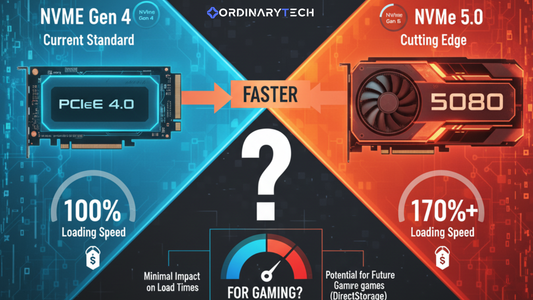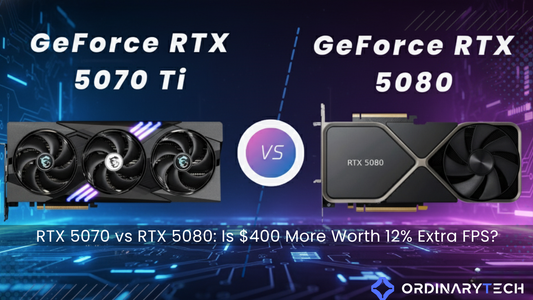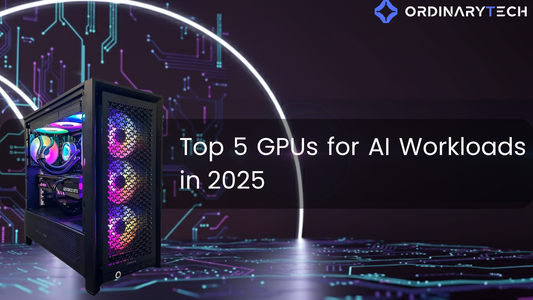
RTX 5070 vs RTX 5080: Is $400 More Worth 12% Extra FPS?
Sadip RahmanShare
RTX 5080 vs RTX 5070 Ti: Breaking Down the Real Performance Gap in 2025
NVIDIA's Blackwell architecture has landed, and system builders across Canada are asking the same question: is the RTX 5080's premium justified over the 5070 Ti? After configuring dozens of workstations with both cards this month, the answer depends entirely on what you're building for - and it's not as straightforward as the spec sheets suggest.
The raw numbers tell one story: the RTX 5080 delivers 10-15% better gaming performance while costing nearly double the 5070 Ti's $549 MSRP. But real-world testing reveals a more nuanced picture that could save you hundreds or unlock critical workflow improvements.
Performance Reality Check: Where the 15% Actually Matters
Synthetic benchmarks show the RTX 5080 posting a commanding 52.9% lead in raw compute power, but gaming tells a whole different story. At 4K resolution with ray tracing enabled, you're looking at the difference between 68 fps and 78 fps in Cyberpunk 2077 - noticeable, but not transformative. The gap shrinks further at 1440p, where both cards comfortably exceed 100 fps in most titles.
What synthetic tests miss is thermal behavior under sustained loads. The 5080's 360W power draw generates significant heat that can throttle performance in compact builds. We've seen several Toronto content creators switch from planned 5080 builds to 5070 Ti configurations paired with better cooling solutions, achieving more consistent render times in Blender despite the theoretical performance deficit.
Quick Win: If your case has limited airflow (under 3 intake fans), the 5070 Ti's 250W TDP often maintains higher sustained clocks than a thermally constrained 5080.
The Value Equation: Performance Per Dollar in Practice
At current pricing, the RTX 5070 Ti delivers approximately 30% better performance per dollar - a metric that resonates with businesses managing multiple workstation deployments. Consider a typical scenario: equipping a five-person VFX team. Choosing 5070 Ti cards saves $2,250 that could fund NVMe upgrades or additional RAM across all systems.
The calculation shifts for specific professional workflows. AI model training benefits disproportionately from the 5080's additional CUDA cores, often showing 20-25% faster epoch completion times. Video editors working with 8K RAW footage see similar gains, particularly in DaVinci Resolve where GPU acceleration directly impacts timeline scrubbing responsiveness.
| Workload Type | RTX 5070 Ti Performance | RTX 5080 Advantage | Worth Premium? |
|---|---|---|---|
| 1440p Gaming | Excellent (100+ fps) | +10-12% | No |
| 4K Gaming | Very Good (60-80 fps) | +12-15% | Situational |
| 3D Rendering | Strong | +18-22% | Yes for production |
| AI/ML Training | Capable | +20-25% | Yes |
Power Efficiency: The Hidden Cost Factor
Both cards leverage GDDR7 memory and improved Blackwell efficiency, but power consumption tells something different at scale. The RTX 5080's 5.9% better performance-per-watt sounds minimal, yet it becomes relevant in two scenarios: high electricity rate regions and 24/7 render farms.
A single 5080 running continuous workloads in Canada, Toronto adds roughly $8-12 monthly to power bills compared to a 5070 Ti. Multiply that across a render farm or mining operation, and the operational cost difference becomes substantial. Conversely, the 5080's efficiency advantage means it completes tasks faster, potentially offsetting energy costs through reduced runtime.
Real-World Build Recommendations
After building systems with both GPUs throughout October 2025, clear use-case patterns have emerged. Competitive esports players rarely benefit from the 5080 - they're already CPU-bottlenecked at the lower resolutions where high refresh rates matter most. The 5070 Ti paired with a stronger CPU delivers better results.
Content creators face a more complex decision. Those rendering occasional projects find the 5070 Ti sufficient, while studios billing by the hour justify the 5080 through faster turnaround times. One animation studio client calculated that the 5080's time savings across their team would recoup the investment within four months.
Machine learning developers present the clearest case for the 5080. The additional CUDA cores and memory bandwidth translate directly to productivity. Training runs that take 8 hours on a 5070 Ti complete in 6 hours on a 5080 - a difference that compounds across iterative development cycles.
"We initially spec'd RTX 5070 Ti cards for our new AI workstations, but after testing both, the 5080's advantage in transformer model training justified the premium. It's not about raw performance - it's about developer time saved." - Recent OrdinaryTech enterprise client
Making the Right Choice for Your Build
The RTX 5080 versus 5070 Ti decision ultimately hinges on your specific performance thresholds and budget flexibility. For most users, the 5070 Ti hits the sweet spot - delivering 85% of the 5080's capability at roughly half the price. The remaining 15% only matters when it crosses critical thresholds: the difference between 55 and 65 fps at 4K, or 6-hour versus 8-hour render times.
Consider your complete system balance too. That $450 price difference could upgrade from a 1TB to 4TB NVMe drive, double your RAM from 32GB to 64GB, or step up to a higher-tier processor. These alternatives might deliver more tangible improvements than the GPU upgrade alone.
Frequently Asked Questions
Q: Will the RTX 5070 Ti handle 4K gaming in 2025?
A: Absolutely. The 5070 Ti maintains 60+ fps in most current titles at 4K with high settings. DLSS 3.5 Frame Generation pushes this even higher, making it viable for 4K/120Hz displays in many games.
Q: Is the RTX 5080 worth it for streaming?
A: Not specifically for streaming. Both cards feature identical AV1 encoders that handle streaming workloads equally well. The 5070 Ti is more than sufficient for 1080p/60fps or even 1440p streaming.
Q: How much VRAM difference is there between these cards?
A: None - both the RTX 5080 and 5070 Ti include 16GB of GDDR7 memory. VRAM capacity won't be your limiting factor with either card through 2025 and likely beyond.
Explore More at OrdinaryTech
Ready to configure your perfect Blackwell-powered system? Our team has hands-on experience optimizing builds with both the RTX 5080 and 5070 Ti for clients across Toronto and beyond.
- Browse our workstation configurations featuring both GPU options
- Explore gaming PCs optimized for your performance targets
- Discover OrdinaryAI workstations built for machine learning workflows
The RTX 5070 Ti offers exceptional value for most users, while the 5080 serves those who need every frame or minute saved. Still unsure which fits your workflow? Book a free consultation with our system architects to discuss your specific requirements.
Written by Sadip Rahman, Founder & Chief Architect at OrdinaryTech



